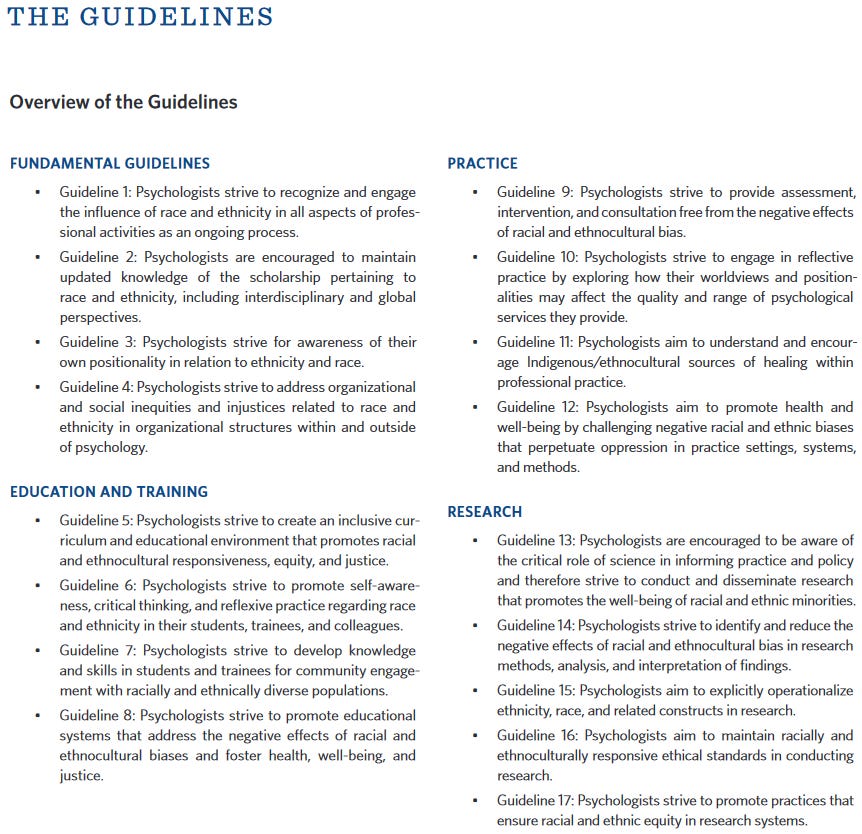The American Psychological Association posted a thread [1] a while ago apologizing for its role “in contributing to systemic racism.”
This seems to have flown under the radar, but this isn't just woke posturing: the APA standards and guidelines page has an entire section [2] dedicated to "advancing multiculturalism, diversity, and social justice in psychological education, research, and practice."
The APA taskforce on Race and Ethnicity Guidelines in Psychology also published an entire 60-page document [3 & 4] on race and ethnicity guidelines in psychology. Particularly concerning are Guidelines 13 & 14:
They're worse than they sound. Right off the bat, Guideline 13 begins by stating that "A core value of APA is social justice, diversity, and inclusion" and that "To apply this guideline, psychologists are encouraged to proactively challenge racism..."
It rejects that "psychological science is value neutral," and encourages that training programs incorporate "(b) psychological science that challenges racial inequality;...(f) intersectional designs that address complexities of the lived experiences of underrepresented racial and ethnic groups;...and (h) use of research findings to promote policy changes consistent with the prosocial values of psychology."
The "Rationale" header of Guideline 14 states that "comparative research approaches are often problematic, contributing to, rather than challenging, bias" except when e.g. "(b) when the purpose is to deconstruct or refute negative 'facts' about racial or ethnocultural minority groups (e.g., conducting research that challenges the belief in genetic inferiority in IQ);"
Under the "Application" header of Guideline 14 it states that "Psychological researchers are also encouraged to avoid simple racial or ethnic comparative studies" except for the "appropriate" use case where e.g. "researchers can include contextual and environmental factors that can help explain findings."
A central justification of the document is that race is a social construct and that "As such, race does not determine beliefs or behaviors; rather, race relations and the ways in which one has been racialized account for much of the racial group differences."
In summary, critical race theory is now fundamentally baked in to the practice/standards guidelines of the APA. Texts in a journal like Psychological Bulletin cannot be regarded as independent support for the Blank Slatist (BS) thesis since ideological alignment is a precondition for publication.
The APA has formally abdicated any claim to empirical neutrality on the subject of race. Signed, the association's chair, various directors, etc.
References:
American Psychological Association. [@APA]. (2021, October 29). With a unanimous vote, the APA Council of Representatives adopted a resolution apologizing to communities of color for APA’s role [Tweet]. Twitter. Retrieved from https://x.com/APA/status/1454186705515384837
American Psychological Association. (Accessed 2024, August 30). APA-approved standards and guidelines. Retrieved from https://www.apa.org/research-practice/standards-guidelines
American Psychological Association, APA Task Force on Race and Ethnicity Guidelines in Psychology. (2019). Race and Ethnicity Guidelines in Psychology:
Promoting Responsiveness and Equity. Retrieved from http://www.apa.org/about/policy/race-and-ethnicity-in-psychology.pdf
American Psychological Association. (Accessed 2024, August 30). APA’s Race and Ethnicity Guidelines. Retrieved from https://www.apa.org/about/policy/summary-guidelines-race-ethnicity











